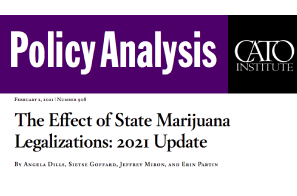EXECUTIVE SUMMARY
In November 2012, Colorado and Washington approved ballot initiatives that legalized marijuana for recreational use under state law. Since then, nine additional states (Alaska, Oregon, California, Nevada, Maine, Vermont, Massachusetts, Michigan, and Illinois) plus the District of Columbia have followed suit, either by ballot initiative or legislative action.
Voters in four other states (New Jersey, South Dakota, Arizona, and Montana) approved state ballot measures legalizing marijuana for personal use in the November 2020 election. Supporters and critics make numerous claims about state-level marijuana legalizations.
Advocates suggest that legalization reduces crime, raises tax revenue, lowers criminal justice expenditures, improves public health, increases traffic safety, and stimulates the economy. Critics argue that legalization spurs marijuana and other drug or alcohol use, increases crime, diminishes traffic safety, harms public health, and lowers teen educational achievement.
In previous work, we found that the strong claims made by both advocates and critics are substantially overstated and in some cases entirely without support from existing legalizations; mainly, state legalizations have had minor effects.
This paper updates previous work to account for additional years of data and the increase in the number of states with legalized marijuana. Our conclusions remain the same, but our assessments of legalization’s effects remain tentative because of limitations in the data. The existing data nevertheless provide a useful perspective on what other states should expect from legalization or related policies
PA908

















